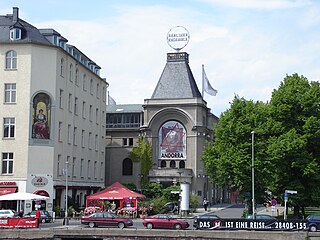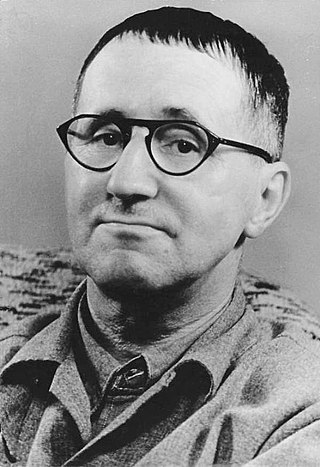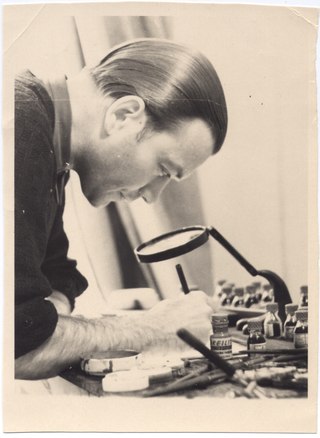Related Research Articles
The Resistible Rise of Arturo Ui, subtitled "A parable play", is a 1941 play by the German playwright Bertolt Brecht. It chronicles the rise of Arturo Ui, a fictional 1930s Chicago mobster, and his attempts to control the cauliflower racket by ruthlessly disposing of the opposition. The play is a satirical allegory of the rise of Adolf Hitler and the Nazi Party in Germany prior to World War II.

Helene Weigel was a German actress and artistic director. She was the second and last wife of Bertolt Brecht until his death in 1956; together they had two children.

The Berliner Ensemble is a German theatre company established by actress Helene Weigel and her husband, playwright Bertolt Brecht, in January 1949 in East Berlin. In the time after Brecht's exile, the company first worked at Wolfgang Langhoff's Deutsches Theater and in 1954 moved to the Theater am Schiffbauerdamm, built in 1892, that was open for the 1928 premiere of The Threepenny Opera.

Benno Besson was a Swiss Theatre Director.

Ruth Berghaus was a German choreographer, opera and theatre director, and artistic director.

The Theater am Schiffbauerdamm is a theatre building at the Schiffbauerdamm riverside in the Mitte district of Berlin, Germany, opened on 19 November 1892. Since 1954, it has been home to the Berliner Ensemble theatre company, founded in 1949 by Helene Weigel and Bertolt Brecht.
A Fabel is a critical analysis of the plot of a play. It is a dramaturgical technique that was pioneered by Bertolt Brecht, a 20th century German theatre practitioner.
Coriolanus is an unfinished German adaptation by the modernist playwright Bertolt Brecht of the English 17th-century tragedy of the same name by William Shakespeare. Brecht wrote it sometime between 1951 and 1953. This adaptation reveals the influence of Mao Zedong on Brecht's social thought especially the idea of primary and secondary contradictions which Mao discussed in his treatise On Contradiction. Brecht alluded to this text and discusses his development on the original and his ideas for its staging in an essay entitled "Study of the First Scene of Shakespeare's Coriolanus", which is written in the form of a dialogue with his collaborators at the Berliner Ensemble theatre company. The play was first staged by Heinrich Koch at the Frankfurt Schauspielhaus theatre, where it opened on 22 September 1962. It was later staged by the Berliner Ensemble in September 1964. Ruth Berghaus became famous for her staging of the battle scenes in this production. The play was published in an English translation by Ralph Manheim in volume nine of Brecht's Collected Plays.
The Trial of Joan of Arc at Rouen, 1431 is an adaptation by the German dramatist Bertolt Brecht of a radio play by Anna Seghers. It was written in collaboration with Benno Besson and premiered at the Berliner Ensemble in November 1952, in a production directed by Besson, with Käthe Reichel as Joan.
Don Juan is an adaptation by the twentieth-century German dramatist Bertolt Brecht of the 17th century French play Dom Juan by Molière. It was the first performance of the Berliner Ensemble after its move to Theater am Schiffbauerdamm, in 1954.
Caspar Neher was an Austrian-German scenographer and librettist, known principally for his career-long working relationship with Bertolt Brecht.

Therese Giehse, born Therese Gift, was a German actress. Born in Munich to German-Jewish parents, she first appeared on the stage in 1920. She became a major star on stage, in films, and in political cabaret. In the late 1920s through 1933, she was a leading actress at the Munich Kammerspiele.

Angela Winkler is a German actress.

Erich Gustav Otto Engel was a German film and theatre director.

Eugen Berthold Friedrich Brecht, known as Bertolt Brecht and Bert Brecht, was a German theatre practitioner, playwright, and poet. Coming of age during the Weimar Republic, he had his first successes as a playwright in Munich and moved to Berlin in 1924, where he wrote The Threepenny Opera with Elisabeth Hauptmann and Kurt Weill and began a life-long collaboration with the composer Hanns Eisler. Immersed in Marxist thought during this period, Brecht wrote didactic Lehrstücke and became a leading theoretician of epic theatre and the Verfremdungseffekt.
Hans-Joachim Bunge was a German Dramaturg, Director and Author. Bunge became famous through his conversations with Hanns Eisler about Brecht.

Peter Palitzsch was a German theatre director. He worked with Bertolt Brecht in his Berliner Ensemble from the beginning in 1949, and was in demand internationally as a representative of Brecht's ideas. He was a theatre manager at the Staatstheater Stuttgart and the Schauspiel Frankfurt. Many of his productions were invited to the Berliner Theatertreffen festival. He worked internationally from 1980.
![<i>Mutter Courage und ihre Kinder</i> (film) 1961 [[German Democratic Republic]] film](https://upload.wikimedia.org/wikipedia/commons/thumb/6/6b/Bundesarchiv_Bild_183-80357-0001%2C_Berlin%2C_Kino_%22OTL%22%2C_Nacht.jpg/320px-Bundesarchiv_Bild_183-80357-0001%2C_Berlin%2C_Kino_%22OTL%22%2C_Nacht.jpg)
Mutter Courage und ihre Kinder 1961 East German film produced by DEFA documenting the Berliner Ensemble staging of Bertolt Brecht's play of the same name. The play ran from 1959 to 1961, with Manfred Wekwerth and Peter Palitzsch directing, and stars Helene Weigel in the title role; it was modelled after the original 1949 production by Brecht and Erich Engel. The film received a prize at the Locarno Film Festival.

Hainer Hill was a German scenic designer, costume designer, painter, graphic artist and theatre photographer who was based in Berlin and worked internationally. After studying painting in Frankfurt, he worked at the Oper Frankfurt, assisting Caspar Neher. Together they moved to Brecht's Berliner Ensemble where Hill created an iconic stage for Mutter Courage and took hundreds of scene photographs now archived at the Akademie der Künste. When the Berlin Wall was erected, Hill, who lived in the West and had worked in the East, began to work freelance, including at the Royal Opera House. In 1966 he became director of scenery (Ausstattunggsleiter) at Opernhaus Dortmund, and there he created the stage for the world premiere of Eli by Walter Steffens, which was followed by 45 other productions. Hill is best remembered for his focus on light projection.
Ruth Wilhelmi-König was a German woman stage photographer.
References
- ↑ Parker, S. (2014). Bertolt Brecht: A Literary Life A&C Black.
- ↑ Subiotto, A. V. (1975). Bertolt Brecht's Adaptations for the Berliner Ensemble MHRA.
- ↑ Parker, S. (2014). Bertolt Brecht: A Literary Life A&C Black
- ↑ Wekwerth, M., & Hozier, A. (2011). Daring to Play : A Brecht Companion (1st ed.). Hoboken: Taylor and Francis.
- ↑ Squiers, Anthony (2014). An Introduction to the Social and Political Philosophy of Bertolt Brecht: Revolution and Aesthetics. Amsterdam: Rodopi. p. 190. ISBN 9789042038998.
- ↑ French, S. (2012). The Tutor. Retrieved June 21, 2014, Retrieved from http://www.samuelfrench.com/p/4328/tutor-the
- ↑ Schayan, J. (16 April 2009). 30 german years: 1950-1980. Retrieved 25 June 2014, Retrieved from https://www.deutschland.de/en/topic/politics/germany-europe/30-german-years-1950-1980
- 1 2 Bryant-Bertail, S. (2000). Space and Time in Epic Theater: The Brechtian legacy (Illustrated ed.) Boydell & Brewer.